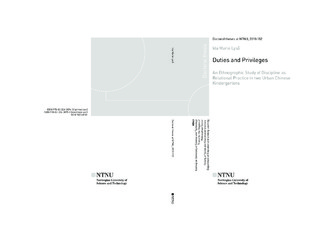Duties and Privileges: An Ethnographic Study of Discipline as Relational Practice in two Urban Chinese Kindergartens
Doctoral thesis
Permanent lenke
http://hdl.handle.net/11250/2504687Utgivelsesdato
2018Metadata
Vis full innførselSamlinger
Sammendrag
This thesis is an ethnographic study of discipline - as relational everyday social practice – in two urban Chinese kindergartens. The study is based on 11 months of ethnographic fieldwork in two kindergarten classes in Shanghai the autumn of 2011 and the spring of 2012, using participant observation and qualitative research interviews with children and teachers in the two kindergartens. The thesis is written within the interdisciplinary research field of Childhood studies, emphasizing children’s position as social actors and informants in research alongside adults (James and Prout 1997, James et al. 1998), and emphasizing how understandings of childhood and discipline are contextually based (Montgomery 2009).
Bourdieu’s concepts field, habitus and capital constitute an analytical frame for capturing both the social and historical conditions of practice, as well as how agents perceive and operate such practices (Bourdieu 1977, 1992). The research questions are: 1) In which ways are disciplinarian practices present in relationships between teachers and children in the kindergartens? 2) How do the children experience, relate to and partake in such practices? And 3) How do everyday disciplinarian practices relate to contemporary views of, and future concerns with, children and childhood in the Chinese context?
Disciplinarian practices are understood as practices of control, regulation or guidance in the kindergarten everyday life, including elements of self-discipline and the forming and controlling of own habits. Discipline is explored in a wide sense: in spatial and temporal structures (layout of classrooms, wall decorations, division/use of time), in the regulation of bodies (group divisions, individual physical separation, routinized behaviours, rigorous practicing, physical punishment), and in different activities of organized play. In the thesis, attention is also directed at how discipline is expressed and communicated, and how this connects to contextually significant notions of guan (loving control), guai (ideal behaviour) and moral. Furthermore, practices of evaluation, differential treatment and comparison are explored through the notion of relationality. Values of order and control, correct behaviour, evaluation, and the public character of discipline in the kindergartens are emphasised throughout the chapters. Such practices and structures make out the social conditions of the field, and the embodiment of such practices and values are particularly emphasised (Bourdieu 1977). This part of the thesis particularly refers to adult-child relationships in the kindergartens, which is theorized using the notion of generational ordering as a mutually constitutive aspect of intergenerational relationships in the kindergartens (Alanen 2009, 2015).
Particular forms of field-specific embodied cultural capital (kindergarten, guan and guai) exemplifies how children themselves partake in disciplinarian practices. These practices are not only top-down, teacher-child ordered practices, but also significant in relations between children, both in everyday life as well as in assigned tasks involving practices of domination in the classroom, exemplified through the tasks of duty children, little teachers and team leaders. The children did however, not have equal opportunity to dominate others due to their differential endowment with and use of capital and thus their position in social space, and such variations are explored with reference to a relational understanding of agency (Burkitt, 2016). A relational (interdependent and differential) aspect is thus part of the children’s practical sense (habitus) (Bourdieu and Wacquant, 1992) of discipline, along with a form of situational sensitivity and a seizing of opportunities for secrecy and play, including the challenging of field values.
A concern in literature on contemporary Chinese childhoods is that raised living standards, the opening up policy, and particularly the ‘one-child policy’ has led to a generation of spoiled ‘little emperors’ receiving too much attention from parents and grandparents (“4-2-1 family syndrome”). Chinese kindergartens are considered an appropriate place to deal with this challenge, in part through practices of control and discipline, while simultaneously securing cultural continuity and providing social change (Hsueh and Tobin, 2003). The final analytical chapter of the thesis describes how such concerns are met in one of the kindergartens through a particular form of educational approach called ‘frustration education,’ which aimed to balance out children’s emotional state in order to enable them to cope with challenges in their contemporary and future daily lives.
The conceptual pair duties and privileges serve as a useful representation of the daily experiences with discipline of children in two urban Chinese kindergartens, as well as reflect views of children and childhood, and the individual in the Chinese context (Bakken, 1994; Xiaotong 1992; Hansen & Svarverud, 2010).
